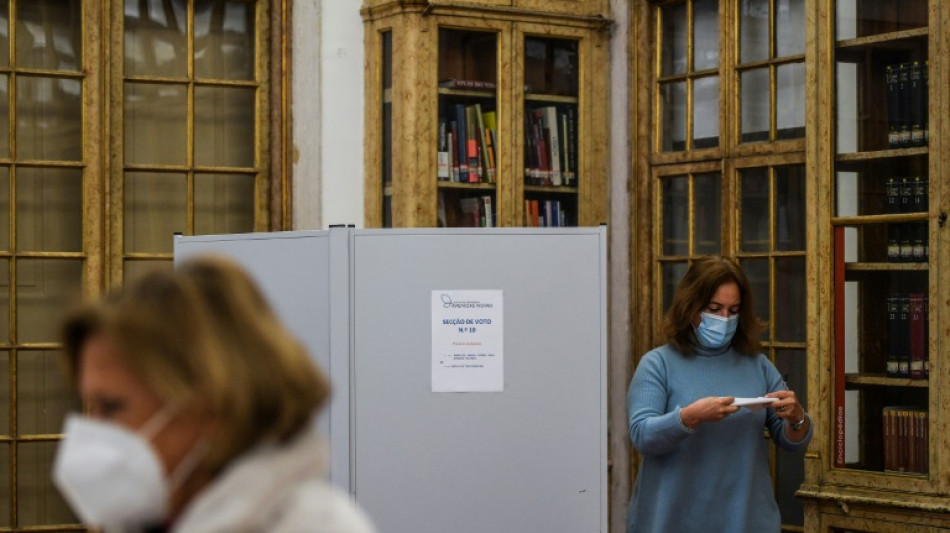
| CMSC | -0.17% | 22.425 | $ | |
| RBGPF | 1.47% | 68 | $ | |
| RYCEF | -2.16% | 9.7 | $ | |
| SCS | -0.32% | 11.065 | $ | |
| NGG | -0.47% | 65.263 | $ | |
| GSK | -1% | 38.355 | $ | |
| RELX | -0.24% | 50.04 | $ | |
| BTI | 1.59% | 41.165 | $ | |
| AZN | -1.24% | 72.885 | $ | |
| RIO | -2.55% | 59.515 | $ | |
| VOD | -0.96% | 9.36 | $ | |
| BP | -0.61% | 33.655 | $ | |
| BCC | -0.39% | 97.919 | $ | |
| JRI | 0.54% | 12.94 | $ | |
| BCE | -0.04% | 22.96 | $ | |
| CMSD | -0.07% | 22.695 | $ |

Socialist reign at stake in Portugal election
Portugal voted Sunday in a close-fought election, with no party expected to garner a majority in parliament in a fragmented political landscape that could see the far right make huge gains.
Socialist Prime Minister Antonio Costa is fighting for his political life after a late surge by the centre-right opposition PSD party clawed away his side's once comfortable poll lead.
The two parties are in a statistical tie according to final surveys.
The prospect of another weak minority government comes as Portugal is trying to boost its tourism-dependent economy which has been badly hit by the coronavirus pandemic.
A stable government is needed for Portugal to make the most of a 16.6-billion-euro ($18.7 billion) package of EU recovery funds it is due to receive by 2026.
"Portugal needs stability after these two difficult years of fighting against the pandemic," Costa, in office since 2015, told a final rally in second-city Porto on Friday.
Sunday's snap polls were called after two far-left parties that had propped up Costa's minority government sided with right-wing parties to reject his 2022 draft budget in October.
- PSD gains -
While the survival of the Socialists' government is at stake, the party is faring better than its peers in many other European nations such as Greece and France where they been virtually wiped off the map in recent years.
If the Socialists again garner the most votes but lack a majority, Costa has said he plans to govern alone by negotiating support from other parties for laws on a case-by-case basis.
Such a government would have "little chance" of lasting until the end of its term in 2026, said Lisbon University politics professor Antonio Costa Pinto.
Under Costa's watch Portugal has rolled back austerity measures, maintained fiscal discipline and slashed unemployment to pre-pandemic levels.
But PSD leader Rui Rio says the economy should expand faster. It proposes corporate tax cuts to spur growth.
Rio has managed to unify the often fractious party since he defeated a leadership challenge last year and his strategy of moving the PSD to the centre appears to be bearing fruit.
Under Rio the PSD defied the odds and booted the Socialists out of office in a regional election in the Azores islands in 2020 and the Lisbon mayor's office last September.
He is open to forming a coalition with the conservative CDS and the upstart libertarian Liberal Initiative party.
But such a coalition would need the support of far-right party Chega, which polls suggest could emerge as the third-biggest party in parliament, mirroring recent gains for such formations across Europe.
- Far-right 'hostage' -
Chega, which translates as "Enough", entered parliament for the first time with a single seat during the last election in 2019.
Costa has warned that a PSD-led government would be a "hostage" to Chega, whose proposals include tougher Covid-19 confinement rules for Roma people and castrating sex offenders.
Rio accuses Costa of fear-mongering.
He has vowed not to include Chega in a government but has indicated he is willing to head a minority government propped up by support in parliament from the far right.
The election is taking place amid a surge in new Covid-19 cases and many voters said they came as soon as ballot stations opened to avoid crowds.
"It is important to come early because of what is happening," said Antonio Xavier, an 84-year-old retired shipyard mechanic after he voted at a school in Almada, a city just south of Lisbon.
The authorities are allowing people who are quarantining because of the virus to leave home to cast their ballot, with a recommendation they vote in the slower final hour.
T.Bastin--JdB



